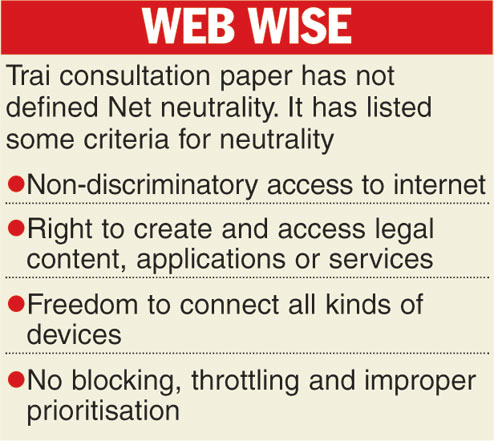
New Delhi, Jan. 4: Regulator Trai today invited public views on the contentious Net neutrality issue to finalise a framework that would ensure telecom operators do not manipulate network speeds for giving preference to any website or platform over the internet.
The Telecom Regulatory Authority of India has floated an idea of identifying a body that should be responsible for monitoring and supervision of any Net neutrality violations.
"Trai has released a consultation paper on Net neutrality. The purpose of this second stage of consultation is to proceed towards the formulation of final views on policy or regulatory interventions, where required, on the subject of Net neutrality," Trai said.
The last date for public comments on the paper is February 15 and for counter comments is February 28.
The regulator has already conducted the first round of consultation to understand the key issues that need to be looked into for framing Net neutrality rules.
"The ongoing consultation process was initiated pursuant to this reference from the department of telecom (DoT). The present consultation paper is accordingly being issued in continuation to the 'Pre-Consultation Paper on Net neutrality'," Trai said.
Trai in its pre-consultation paper dated May 30 discussed issues such as the definition of Net neutrality, scope of traffic management practices, importance of unrestricted access and transparency, need for preserving customer privacy and national security. It also highlighted salient points of the proposals made by the committee constituted under the DoT in May 2015.
The DoT panel has proposed regulation of domestic calls on Internet-based apps such as Skype, WhatsApp and Viber by putting them on a par with services offered by telecom operators, a recommendation that came under immediate attack from industry bodies.
The DoT committee opposed platforms such as Facebook's Internet.org that allowed access to certain websites without mobile data charges, while suggesting that similar plans by Bharti Airtel be allowed with prior clearance from Trai.
However, the committee suggested liberal approach to app-based international calls.
The government has said that it will decide on the framework for net neutrality after getting recommendations of Trai on the subject.
Though there is no standard definition of net neutrality, certain sections have described it as equal treatment be accorded to all Internet traffic and no priority be given to an entity or company based on payment to content or service providers such as telecom companies, which is seen as discriminatory.
Trai has already firmed up regulation on discriminating content on the basis of tariff by barring zero rating platforms.
The consultation paper on discriminatory tariff, which closed in January 2016, was the highest debated which attracted comments from over 24 lakh people.
Jio, Tata Tele move
Reliance Jio and Tata Tele Services (TTSL) today opposed in the Delhi high court the pleas filed by telecom firms Bharti Airtel and Vodafone challenging Trai's interconnect use charges regulations fixing termination charges for landline to wireless as zero paise and wireless to wireless at 14 paise per minute.
Interconnection use charges (IUC), or termination charges, are payable by one teelcom firm, whose subscriber makes a call, to another whose subscriber receives the call. The charge is payable by the first for using the second's network.
The counsel appearing for Reliance Jio and TTSL told a bench of Chief Justice G. Rohini and Justice Sangita Dhingra Sehgal that they were opposing the petitions filed by Airtel and Vodafone.
To this, the bench said, "We felt that all the service providers are on the same footing."
However, senior advocate P. Chidambaram, who was appearing for one of the petitioners, told the bench that service providers who have less customers are not at a "disadvantage" but operators having a large customer base are "suffering" because of the regulation.
He argued that the service providers were suffering loss because of the termination charges fixed by Trai regulation.
"I have incurred huge amount in my infrastructure. If somebody is using my infrastructure and earning revenue, they have to share it with me and I should also get some revenue out of it," he told the bench during the arguments which would continue on January 9.
"Bigger network providers are suffering wider disadvantage," he said, adding, "sharing the revenue does not mean that somebody will collect the revenue and will not share it with me. Sharing the revenue can never mean 100 on the one side and zero on the other".
Chidambaram also questioned the power of Trai in fixing termination charge as zero.










